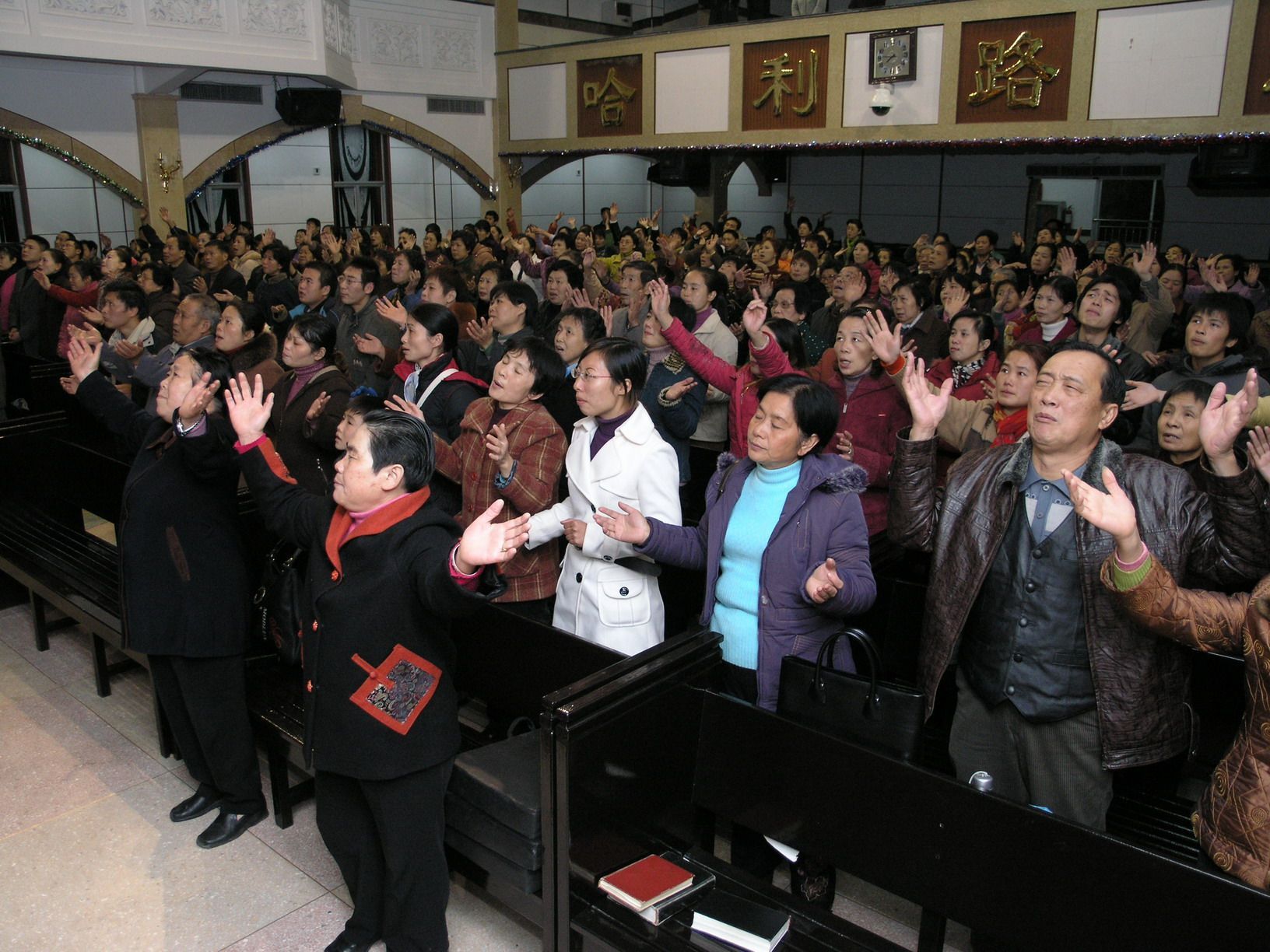1980s
The Unstoppable A-Hmao Church
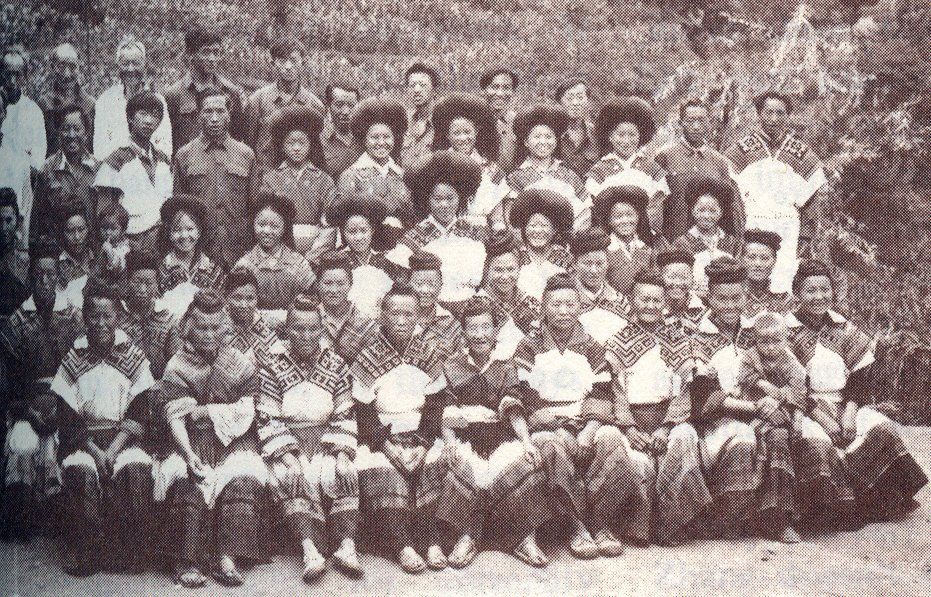
The A-Hmao congregation at Banpo in 1987.
After the death of Mao and the end of the Cultural Revolution in 1976, the 1980s dawned with Christians hoping for greater freedom to worship. The A-Hmao believers continued to be poor by the standards of this world, but their faith had been refined like pure gold. One visitor said of the A-Hmao believers in 1987:
"They witness to God, not by appearance, but by their living. Their mouths are not filled with theological terms or Biblical messages. Pastors do not wear ties, white shirts and dark blue pants; nor do they carry the Bible with them everywhere. What they wear are work clothes; what they carry are agricultural tools. They carry bamboo baskets with heavy loads on their backs....
The A-Hmao Christians are a blessed community. They follow Christ family by family. Around 80 percent of the villagers are believers. This enables them to enjoy the blessings of God's life in a community of fellowship."
Harsh persecution of the Christians among the A-Hmao and other Miao tribes commenced in the early 1950s and continued in waves for the next 30 years. Instead of decimating the churches as the authorities expected, however, one researcher found that the persecution been the catalyst for massive growth in the number of A-Hmao believers:
"In 1950 in the Hezhang District of Guizhou there were 9,800 Miao Christians meeting in 50 churches, according to a local government report. By 1986 they had grown to 23,000 believers meeting in 90 churches.... The government also discovered that in 1986 the Miao believers in Wumeng had grown 10-fold from about 3,000 in 1950 to 30,000."
An encouraging report noted that revival had impacted several different people groups: "Through it all, the church has moved forward. In the Wumao mountain area of Guizhou Province, Christians were estimated to be 70,000. This number includes A-Hmao, Gha-Mu, Hmong Shua, and some Nosu."
Because of the large number of A-Hmao people who started following Jesus Christ throughout the 1970s and 1980s, it was deemed necessary to print 20,000 copies of their New Testament in 1983. These were soon put to good use, and an additional 30,000 copies were printed to meet the demands of additional new believers in 1988.
House Church Missionaries Arrive in Guizhou
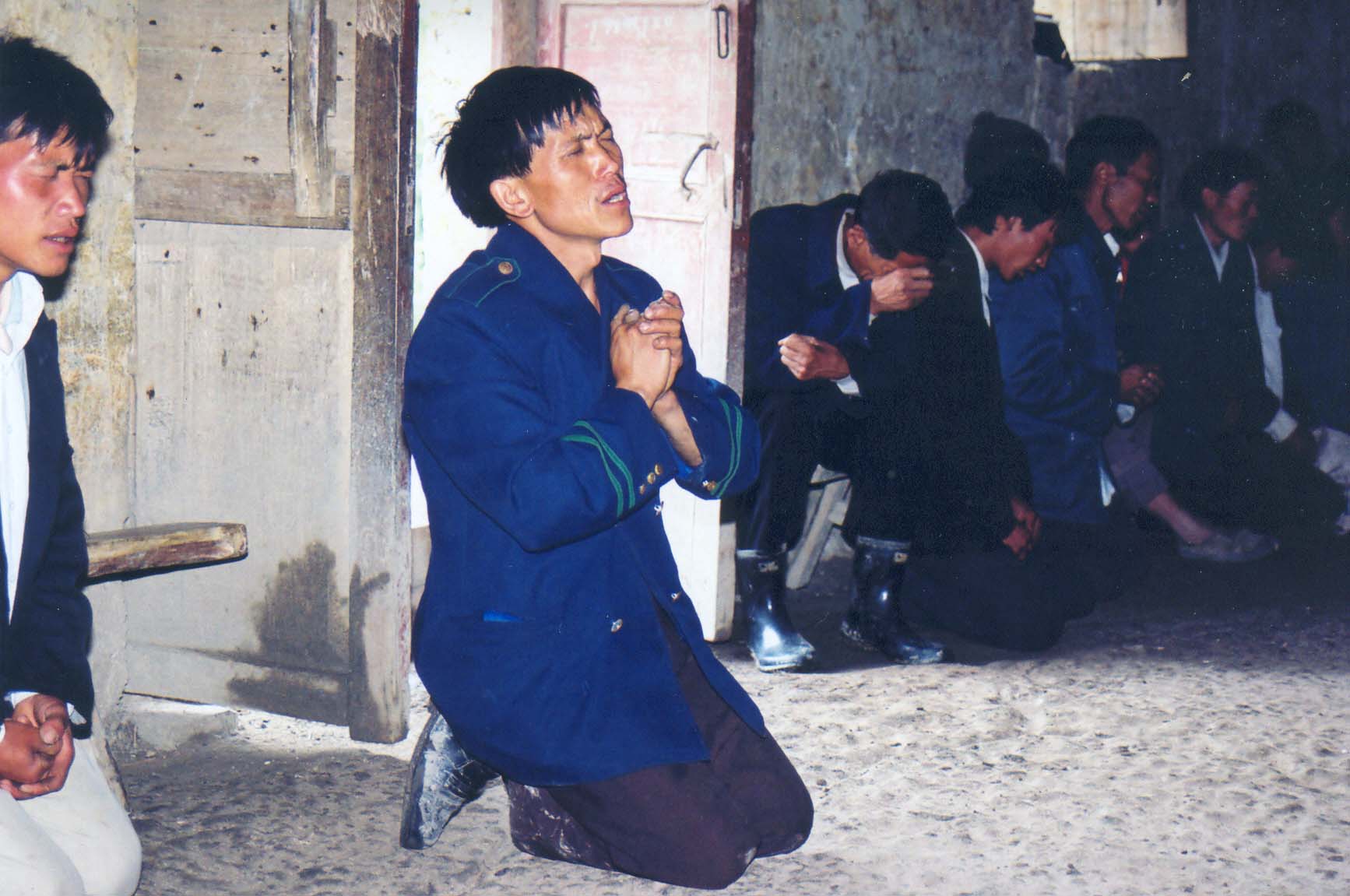
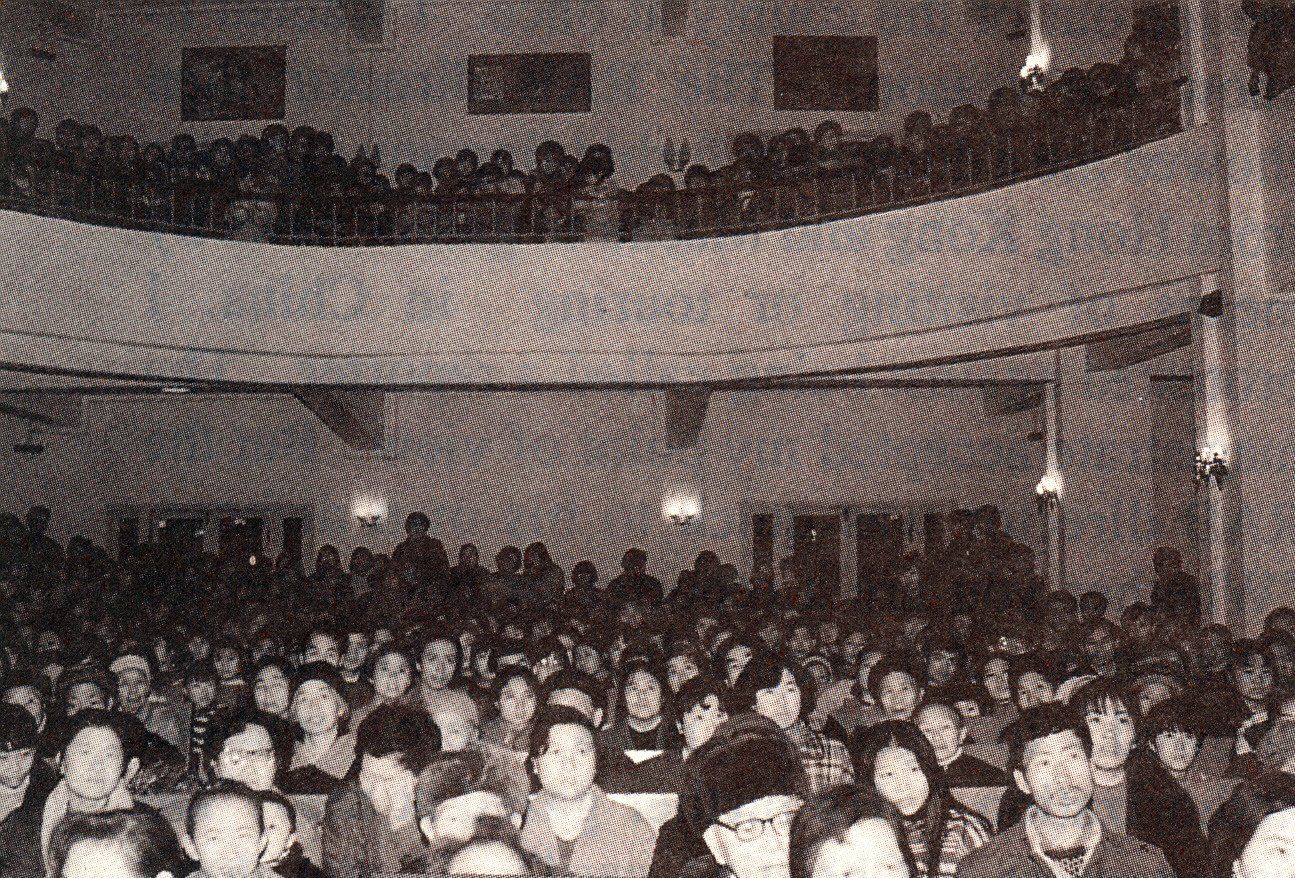
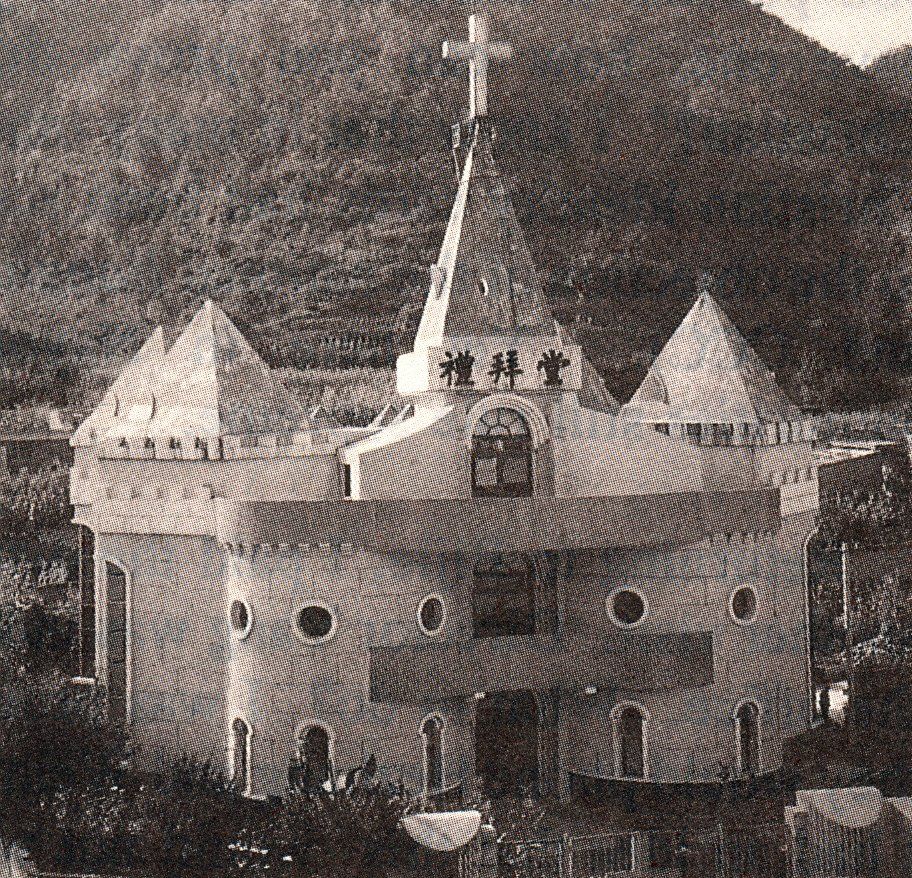
The impressive Three-Self Church at Bijie in northwest Guizhou.
The government-sanctioned Three-Self Church in China gained a terrible reputation among sections of the Chinese Church between its founding in 1951 to the end of the 1970s, when many Three-Self pulpits were filled by Communist officials who gave political and patriotic speeches instead of teaching from the Bible.
In many places, the atheistic government-appointed pastors in the registered churches were widely known to have betrayed Jesus Christ and His followers. Some had even been personally involved in the persecution of house church leaders, having them arrested, tortured and thrown into prison for years.
The independent house church believers saw it as ludicrous and disgraceful that such men could ever be considered leaders of God's flock, and they strongly opposed the Three-Self Patriotic Movement—a stance that continues for millions of house church Christians to the present day.
By the early to mid-1980s, however, a relaxation of the government's religious policies promised to thaw the frosty relationship between the State and the body of Christ. Throughout Guizhou, many underground churches were faced with a difficult decision—whether to remain hidden or to risk trusting a government that had ruthlessly persecuted them for decades.
Many house churches decided that registering their congregations was a step too far, and they remained independent and outside government control. Others, however, thought it was time for change, and they believed the potential benefits of registering would outweigh the risks.
Many Christians in Guizhou's Gebu County decided to register. Their churches had grown steadily over the years, and they believed it was the right pathway to pursue. In 1986, "14 Miao pastors, 26 elders and 27 preachers were ordained at Gebu, which indicates a healthy, growing church. By May 1990, a group of 500 Christians crammed into one church where 80 were awaiting baptism."
How the Churches Grew
By the late 1980s the Church in Guizhou was experiencing strong growth among both the Han Chinese majority and the myriad of colorful minority groups scattered throughout the province. During a discussion with an elderly Chinese house church pastor named Wu and his wife, a visitor had his conversation interrupted by three young men who had just arrived from a distant mountain village. They were covered in dirt and glistening with sweat, and looked like they hadn't slept for days. They immediately asked Wu, "Do you have any Bibles?"
Desperate believers had sent the three young men hundreds of miles by truck and train to find Bibles. The pastor filled their bags with copies of God's Word and told them where they could obtain more. The visitors were overjoyed!
After the men gave thanks to God and commenced their long journey home, Pastor Wu resumed the conversation by sharing how the Holy Spirit had given strategies to believers which enabled them to more effectively reach people for Jesus Christ. Although it wasn't possible to preach on the streets in China or pass out literature without being arrested, he explained:
"The people invite us into their homes, especially in rural areas, where 20 to 30 will often gather to hear the gospel in an open courtyard. Most of them want to be prayed for because they have a relative or friend who has been healed through prayer. In these circumstances we have to write down their names and pray for the people in the order they are listed. God is so good. He honors their faith and usually about 70 percent of the sick are healed.
When a miracle of healing takes place, a whole family will believe. Sometimes that includes many relatives living in the same village. Then we will have a special service in their main courtyard when we burn the idols the family has been worshipping. Superstition and idol worship are just as common as before the Communist revolution in rural areas, and so is fear and dread of evil spirits. But deliverance comes with the preaching of Christ and His resurrection. So the message has spread far and wide.
When these new believers have a wedding or a first-month birthday celebration for a new baby, they invite us to speak to the guests. They especially want us to attend funerals. On all of these occasions, the Christians take part, sharing their faith with the large numbers of people in attendance. The authorities make no objection when the gospel is spread this way."
Pastor Wu personally encountered many trials and persecutions for the gospel during his years of ministry, but the Holy Spirit always gave him words to say at crucial times. Once, Wu was arrested in a remote area of Guizhou for distributing Bibles. When he returned home to the capital city, the police interrogated him. When they demanded to know if he had handed out Bibles to people, he boldly replied, "Yes, I gave Bibles to the Christians. Some were very poor and we gave them money and clothing, too. Is there anything wrong with that?" The police officers felt ashamed and didn't say another word.
Going the Extra Mile
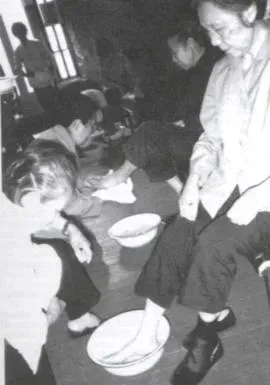
A house church foot-washing service in the 1980s.
The Christians in Guizhou often gained favor with people and with government officials because of the practical help they rendered. In one area, when a section of public road needed repair, the Communist cadre in charge of the project divided the work crew into two groups—Christians and non-Christians. Both started work at the same time, but the believers worked well together and finished their section of the road long before the others, so they joined forces with the non-believers and stayed until the work was completed.
In another part of the province, a new Christian boarded a bus and asked to buy 30 tickets. "Why so many?" asked the surprised vendor. She replied, "I have been riding this bus many times without paying my fare. Now I am a Christian and I want to pay what I owe."
"What is a Christian?" the ticket seller asked. "What kind of person would so such a thing?" An invitation was given to learn more about Jesus Christ, which the ticket seller gladly accepted.
Letters from Guizhou
By the late 1980s many letters were being received by Christian ministries in Hong Kong and elsewhere, shedding light on the situation and needs of the body of Christ in China. While hundreds of letters poured in from across the country, very few were received from Guizhou. One reason was that most believers in the province were tribal Christians who were only able to read and write their own language.
One letter which did emerge from Guizhou in 1986 revealed a desperate need:
"I am a young believer. We have many Christians in the Miao tribe and we now have our own church. Though I am a Christian, I don't have a Bible. I hear people talking about the Bible, but I personally have never even seen one. Could you please send me two Bibles, one being for another brother?"
Another letter emerged in 1989, revealing an urgent need for discipleship among Guizhou's Christians:
"Although I have been a Christian for 10 years, I have never left the elementary teachings about Christ. We lack shepherds and do not know how to press on to maturity. I decided to dedicate my whole family to Christ half a year ago, wishing we could live a victorious life every day. Nevertheless, I am still spiritually weak. Please pray for us."
As the 1980s drew to a close, it was apparent that God was doing a deep and effective work in many parts of Guizhou. Although widespread revival had not yet broken out like in other provinces of China, the kingdom of God was quietly growing one believer at a time, and many whose lives had been transformed by the Holy Spirit were actively sharing the Good News with their relatives and neighbors.
The suspicion that the gospel had been steadily gaining ground in Guizhou was confirmed in 1987, when an official publication estimated there were 100,000 believers just in the government-approved Three-Self churches in the province. In addition, thousands of independent house churches had sprung up across Guizhou, which were believed to contain at least 250,000 believers at the time.
© This article is an extract from Paul Hattaway's book 'Guizhou: The Precious Province'. You can order this or any of The China Chronicles books and e-books from our online bookstore.





